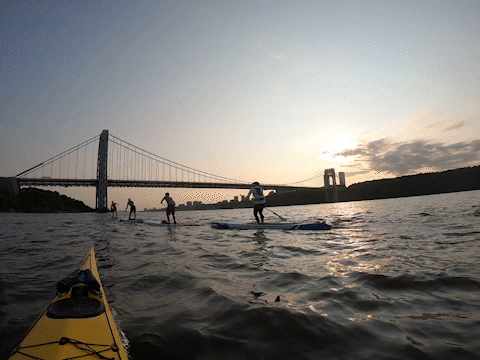🤯Unknown Unknowns #69 - Controlled by Stories
Last weekend, I paddled around Manhattan. It sounds crazy, it took 9 hours and it almost feels like you start on one day and end on another.
But it’s an amazing experience. You get to see the city from completely different vantage points. The memories will last for the rest of your life.
I took a lot of lessons from the trip as well.
The challenge. Just thinking about the trip boggles the mind.
The fear. After the first few miles, you hit a point of no return. No matter what, you must press forward.
Preparation. How much water to bring? We were supposed to arrive back during the day, but the last couple of miles were in the dark. I was glad my wife told me to bring some lights.
I just moved this newsletter to Substack. Substack’s deliverability rates are supposedly the best in the business, so if this is the first issue you've received in a while, please check out the archive. You can now follow the newsletter by RSS at https://unknown-unknowns.xyz/feed
Discoveries:
Life is hard enough without self-imposed obstacles, and it’s even trickier when you don’t even realize the obstacles exist. Emotion can short-circuit your decision-making process.
You might remember Dave Chappelle’s “When Keeping it Real Goes Wrong”. It showed the ridiculous consequences when pride got in the way of common sense.
But your emotions might be driven by things out of your control. How much do cultural norms play a part in shaping your behavior?
1️⃣
Warren Buffett is known for saying that there are no extra points for the degree of difficulty in investing. Just because something is hard doesn’t make you extra money.
But in terms of investing, there is no degree of difficulty. If something is staring you right in the face and the easiest decision in the world, the payoff, can be huge. And we get paid, not for jumping over 7-foot bars, but for stepping over 1-foot bars. And the biggest thing we have to do is decide which ones are the 1-foot bars and which ones are the 7-foot bars so when we go to step we don't bump into the bar. And that is something that I think we're reasonably good at. - 2005 Annual Meeting
Just as there is no reward for the degree of difficulty in investing, there’s no reward for unnecessary difficulty in life (beyond any intrinsic value you might get). It's a self-imposed handicap. DIY fixing a sink gets the same utility as calling the plumber (unless you get satisfaction from working with your hands).
2️⃣
The language we use affects our perception of color. The Himba language, from Namibia, has one word for blue and green, and they had difficulty differentiating between the two colors. Nat Eliason examines how language can affect our worldview by looking at the term “work-life balance”.
By changing the language we use in our heads, we can radically shift our view of the world in the places it matters most.
But the “balance” term still feels inadequate because of how adversarially it frames the relationship. Our goal is not balance. It’s for each piece of our life puzzle to support the other pieces as much as possible. To see them as additive to the others, not subtractive. For the life buckets to be integrated, not separated.
3️⃣
There's actually a concept for words affecting how you feel. It's called the Russell Conjugation. The emotional content of a phrase matters as much as the factual content.
I am firm. [Positive empathy]
You are obstinate. [Neutral to mildly negative empathy]
He/She/It is pigheaded. [Very negative empathy]
While all three sentences have the same factual content, you can debate how true each one is. If the phrasing can change how truthful something is, what power does that give to those who realize?
4️⃣
This last share, from the Climbing Gold podcast, demonstrates how the emotional impact of language can affect your degree of difficulty.
Quick vocabulary lesson:
“Hang-dog” is a pre-1990s pejorative that means a climber who hangs on the rope, trying to figure out how to get through a difficult section.
“Projecting” is a post-2000 term that means a climber who hangs on the rope, trying to figure out how to get through a difficult section.
Hang-dogs were thought of as cheaters, if you fell off the route you were expected to get lowered down and start the route over from the beginning. Alan Watts started a revolution by leaning into being a hang-dog. It turns out that if you practice hard sections without starting from the beginning every time, it makes improving much easier.
Hang-dogs started becoming the best climbers and the method became legitimized and known as projecting. Alan Watts destigmatized the practice. Generations of climbers had been held back purely because of cultural norms.
Examine your own beliefs and limitations from this lens. Is what’s holding you back just a story?
Questions, suggestions, complaints? Email me at [email protected]. Feedback welcome.
If you enjoyed this newsletter, please share it with a friend or two. And feel free to send anything you find interesting to me!
Leaving you in peace,
Chris



Yay I get to publicly comment now
9 hours paddling around Manhattan?! Legit.
Love the Alan Watts story. Let me think about how I can break some norms...
As always, learned so much. And now get to SAY so!!!
And paddling around Manhattan? What were you thinking? To extend your plumber analogy, have you heard of the Circle Line Tours?!